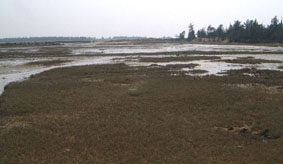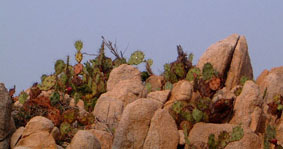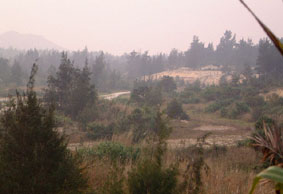Qizi Bay: Biodiversity |
One of the sad things about Qizi Bay is that, like many places on earth, it has not escaped the environmental destruction that comes with human contact. The removal of most of the pebbles from the beach is an obvious example. But while this may spoil people's enjoyment, it probably has little real impact on the natural ecology.
Much more serious are the destruction of entire populations of local species and the rampant introduction of exotic species.
As we gazed at the scene in the photo below, our guide told us that the sandy areas behind the beach were 'desert' just a few years ago. Before that, the area was inhabited by colonies of sea birds as recently as the 1970s. Their disappearance, according to Mr Huang, was due to hunting and the destruction of eggs.
(In fact, very few birds were seen along the whole length of Qizi Bay. At the beach I saw one gull and one or two dotterel-like birds. Along the cliffs a couple of small birds were seen and a few more could be heard, but the numbers were very small. Our guide told us that even sparrows are uncommon in the area, having all been eaten by the local populace.)
|
The currently forested area behind Xiaojiao
became a 'desert' after the colonies of sea birds disappeared.
|
 |
Following the loss of the sea bird colonies, the government's response was to plant the introduced Casuarina equisetifolia to stabilise the sand dunes. The trees you see here are only a few years old. While the demise of sea bird colonies is not necessarily the responsibility of the government, and no one would deny the need to stabilise sand dunes, only a bureacrat would regard the replacement sea birds with exotic plants as 'ecological progress'!
The other extinct inhabitants of the area are monkeys. The monkeys were (according to Mr Huang) hunted to extinction by the locals. It is not clear exactly which 'monkeys' he is referring to. Most likely they were macaques, which are found in other parts of Hainan, such as Monkey Island.
The Japanese military were quite justly hated by the local population for their brutality and inhumanity. Memories of this are kept alive by the locals. By contrast, there is no-one left to hold a grudge for the holocaust that has been visited on other species. The victims have simply disappeared without a trace.
The destruction of habitat continues at Changhua. Coming back into town, we came across what Mr Huang described as a 'mangrove forest'. The mangroves were destroyed by a Mainland developer in the 1980s in preparation for a shrimp farming venture. The venture failed to eventuate and the developer went back to the Mainland, leaving this as his legacy.
|
The 'mangrove forest' near town
|
 |
As if to compensate for the loss of so much, Hainan has been 'blessed' by the introduction of a number of exotic species. Introduced species are not in themselves bad, but they tend to go hand in hand with the simplification and destruction of native environments.
In many places the cliffs of Qizi Bay are overrun with the introduced prickly pear. The prickly pear's only saving grace is that the fruit is good to eat and is supposed to be helpful in treating diabetes.
|
Prickly pears on the rocks at Dajiao
|
 |
Much of the original forest in this area (as in the rest of Hainan) has been replaced by introduced eucalypts. Along the sandy areas of the coast, Casuarina equisetifolia (she-oak) is very much in evidence. Again, this is not necessarily a bad thing. These trees are grown for their beneficial characteristics -- their rapid growth and ability to stabilise sand dunes in the case of Casuarina. But the spread of exotics to the point that they become the dominant component of local plant ecosystems is more characteristic of environmental degradation than of preservation.
|
She-Oaks along the Zhixuan Brook
|
 |
Hainan is a beautiful place, but without more attention to its natural environment (which does not mean reafforestation with eucalypts, as some misguided officials believe), Hainan will never lose its tragic impression of 'a great place that might have been'.